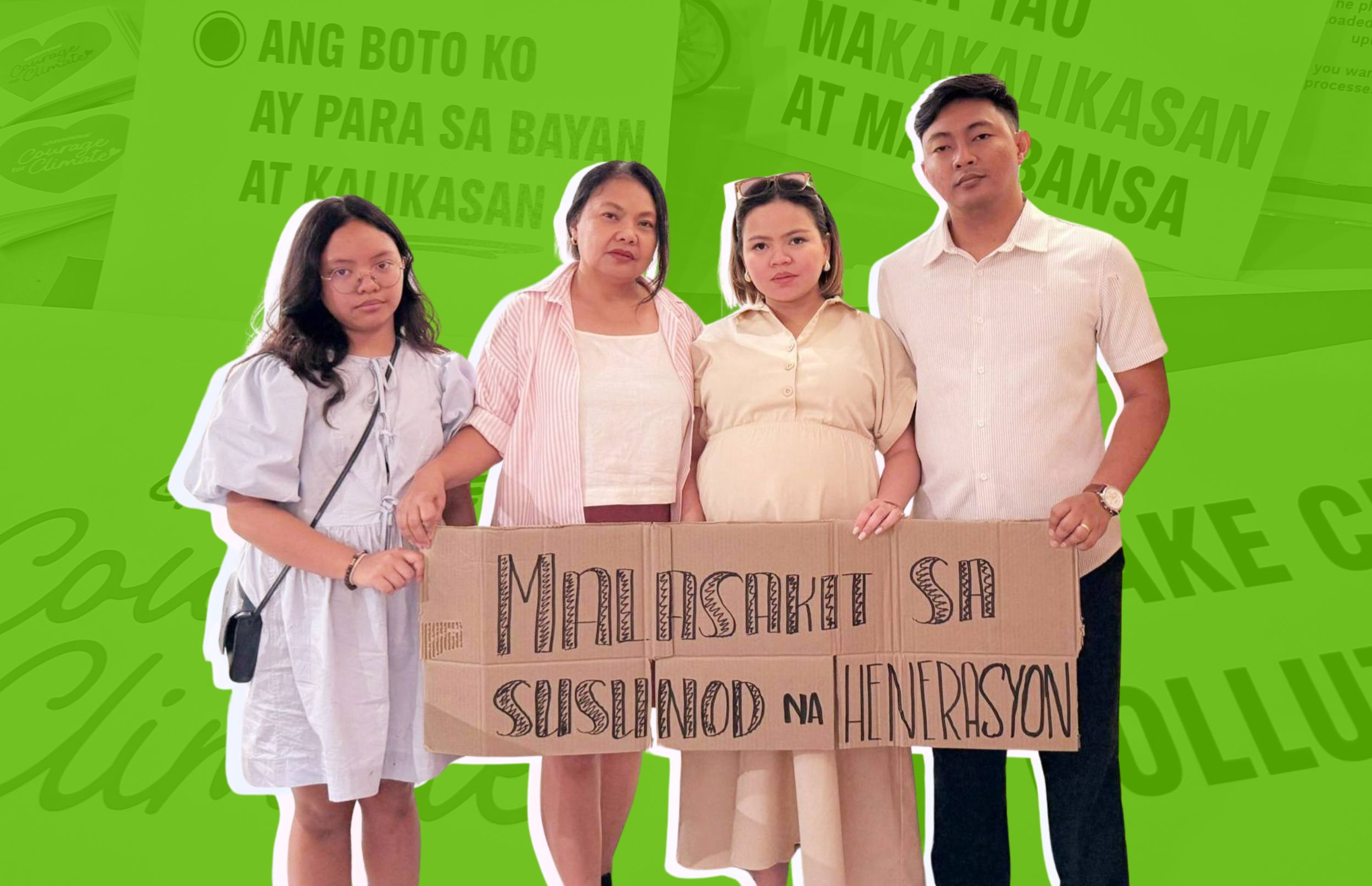– advocates, Filipino communities welcome gov’ oral argument at ICJAO
4 December 2024, Pasay City – Filipino communities, Greenpeace Philippines and the Legal Rights and Natural Resources Center (LRC) today lauded the oral arguments presented by the government of the Philippines at the International Court of Justice’s Advisory Opinion (ICJAO) proceedings in the Hague, Netherlands. The groups said that the strong statement by the Philippines presented a welcome lifeline for the call of Filipino communities for climate justice. This development follows the disappointing outcomes from COP 29 last November.
The ICJ, the world’s highest court, is currently hearing state testimonies related to a request on an advisory opinion on state obligations, and consequences of those obligations, with respect to climate change.[1] States and intergovernmental organisations from all over the world are presenting their oral pleadings to the Court following written comments submitted earlier in the year. Advocates believe that this moment holds the potential to strengthen the boundaries of international law. The ICJ’s advisory opinion will clarify the international legal obligations countries bear in safeguarding people from the impacts of climate change and what must be done in case they breach those obligations.
“[The ICJ’s advisory opinion] has moral authority, and persuasive authority. The interpretation or advisory opinion of the ICJ can be cited eventually to interpret international law,” Atty. Ryan Jay Roset, senior legal fellow at the Legal Rights and Natural Resources Center, or LRC. “If there’s a case brought between states, you can actually say that in this advisory opinion, states have the legal obligation to address climate change, and as a consequence, they should actually do something to prevent or address it. Therein lies the moral and persuasive value of the advisory opinion.”
The Philippines presented their oral argument on Dec 2 (Tuesday night in Manila).[2] In the statement, the Philippines affirmed that climate change “is at its core an existential human rights issue,” and that “the insidious effects of climate change require the entire plethora of customary international law, general principles of international law, and various conventions and treaties be correlated and applied simultaneously.”
Significantly, the Philippines stated that:
“On customary international law, the Philippines submits that the obligation not to cause transboundary harm … compels all states to ensure that activities within their territory and control must respect the environment of other states or of areas beyond national jurisdiction. Hand in hand with the obligation not to cause transboundary harm is the state’s obligation to exercise due diligence. Attendant to this obligation is the adoption of appropriate measures and the exercise of vigilance in their enforcement, as well as the exercise of administrative control applicable to all public and private entities under its jurisdiction.”
“The commission of such internationally wrongful act triggers state responsibility with its necessary consequences and carries with it the obligation of the responsible state to cease the wrongful conduct and make full reparation therefore. Accordingly, states affected by internationally wrongful acts of other states in respect of climate change may demand the enforcement of remedial actions including cessation and or reparation following the injury caused by such internationally wrongful acts.”
In March 2024, Greenpeace submitted a brief to the ICJ on the Obligations of States Regarding Climate Change. The submission is grounded in international law, scientific evidence, and testimonies from affected communities worldwide. These include testimonies from people in the Pacific, typhoon survivors in the Philippines, women in Mexico who had to relocate due to climate change, Saami Indigenous Youth, Senior Women in Switzerland and community activists in South Africa. The testimonies underscore the urgent need for global action to mitigate climate change and protect the rights and well-being of impacted communities worldwide.
The ICJAO proceedings are happening alongside several other climate developments in the Philippines and abroad. Last Monday, Filipino youth together with LRC and Greenpeace Philippines went to Philippine International Convention Center at the venue of the ongoing meeting of the Board of the Fund for Responding to Loss and Damage (FRLD) to jeer at climate polluters, the world’s biggest fossil fuel companies, and rich nations. This week, Frank Melgar, an STY Rai survivor and the lone Filipino plaintiff from the Dinagat Islands in a climate litigation against TotalEnergies, is in France meeting with French government officials, NGOs and media, to tell the story of how Filipinos were affected by one of the world’s strongest typhoons on record that made landfall in his province. Next week, Filipino communities from Dinagat Islands, Eastern Samar, and Bataan will be at the Hague to mount the People’s Museum of Climate Justice, a global online and offline museum of stories from people at the frontlines of the climate crisis.
“Last night, the Philippine government showed that it can be a key part in changing the course of global history on the climate crisis,” said Greenpeace Philippines Country Director Lea B Guerrero. “For decades, Filipino communities have led the way in demanding climate justice, and have been among the loudest voices demanding climate accountability and reparations not only from states but also from fossil fuel companies. With their strong submission to the ICJAO proceedings, the Philippine government has followed suit and stood up alongside impacted communities.”
“Greenpeace is calling on the Marcos Jr administration to follow through and champion a strong climate justice agenda. The administration must: speed up the passage of, and enact, the Climate Accountability Bill; start the process of litigating carbon majors for climate impact damages to the Filipino people, as well as support ongoing climate litigations involving Filipino communities; and call for money for loss and damage, call for reparations, and champion the Climate Damages Tax and other innovative sources of finance to ensure not just adequate funding, but, importantly, payment from corporations, for loss and damage. Further, it must stop all plans for nuclear energy, fossil gas expansion and other false solutions; and enable policy reforms to reshape the economy to enable climate justice and community resilience.”
According to Ka-Jimmy Ceguerra, a community leader of Barangay Tumana, Marikina City, the Court and bodies such as the FRLD should also help ensure direct access for communities frequently hit by climate disasters.
“There should be mechanisms for communities to directly access compensation,” he said, citing his term as a local government official, when he witnessed corruption at such a scale that only a fraction of relief funding reaches those in need. “There should always be a third party such as civil society organizations, in the negotiations, and the communities themselves should always be included, to determine what their actual needs are, and not just perceived needs, both for the long and short term.”
Notes to Editors:
[1] In 2019, 27 law students from The University of the South Pacific united in forming Pacific Islands Students Fighting Climate Change, with a campaign for the International Court of Justice to issue an Advisory Opinion on the responsibilities of States in respect to climate change. The resolution, put forward by Vanuatu alongside a global alliance of States, passed the United Nations General Assembly unanimously in March 2023, co-sponsored by over 130 countries. The Philippines submitted a written statement (yet to be made public by the ICJ as of writing) to the ICJ earlier this year.
[2] Read by Philippine Ambassador to the Netherlands J.Eduardo Malaya, Solicitor General Menardo Guevarra and Permanent Representative to the United Nations in Geneva, Carlos Sorreta, as well as a video presentation by Marine Biologist, Jonathan A. Anticamara, PHD.
###
For more information and interview requests, please contact:
Communications Campaigner
Greenpeace Southeast Asia – Philippines
[email protected] | +63 919 069 3424 (SMART) | +63 960 480 0297 (Viber & WhatsApp)



![[Blog] What community outreach taught me about true Climate Justice](https://www.greenpeace.org/static/planet4-philippines-stateless/2025/03/943e1bf1-1.jpg)